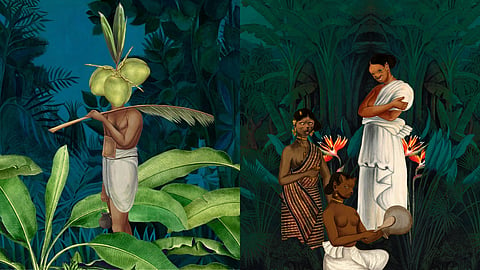
- HOMEGROWN WORLD
- #HGCREATORS
- #HGEXPLORE
- #HGVOICES
- #HGSHOP
- CAREERS
- ABOUT US
- CONTACT US

By definition, proverbs are pithy and insightful. No matter what culture you were raised in, they might’ve been a part of your childhood in the form of a succinct phrase or sentence spouted by well-meaning grandparents and older family members. Deeply rooted in the nuances of the culture and language of its origin, proverbs are an integral part of oral history and folklore.
When growing up in a Malayali household, one would’ve heard an incalculable number of proverbs. It is called 'Pazhamchollukal' — literally translating to old rhymes or sayings. From talking about realising the need to take your elders' words to joking about somebody’s proclivity to never knowing the middle ground — there are a lot of Malayalam proverbs. But as time progresses, many old sayings are being forgotten and the cultural references they allude to are foreign to today’s youth. Today, when someone spouts age-old Malayalam proverbs, youngsters might gape at them, without having a frame of reference.
Sisters Mary Ann Alapatt and Rose Alapatt are millennials who grew up hearing adages like this and were inspired to contemporise them through art. While diversity may exist among the different communities that exist within a state, proverbs are often a unifying factor for those who share a language. For Mary Ann and Rose, who hails from Kochi and started a branding agency during the 2020 lockdown, creating raw and original visual narratives has always been a passion.
The Pazhamchollukal series was a very personal project for the duo as they looked at these sayings and knew how every Malayali hears them in their everyday lives irrespective of religion, class, and gender. They wanted to create a visual representation of proverbs (while acknowledging their problematic aspects) from the oral Malayalam tradition. They went on to say, “In a bilingual post-colonial world, we are conscious of the increasing distance between us and our culture and language. We believe the visual medium can transcend barriers set by language, space, and time and hence is the perfect way to represent our culture and make it more relatable to the coming generations.”
When talking about the inspiration behind the approach they took towards the work, the sisters talked about how they were fans of anime and how cultures around the world bring their identity into the visual world through motion. This is what inspired them to experiment with 2D stop-motion graphics to bring the project to life. Once they had zeroed in on the idea of creating this series, they started by having conversations with their parents and grandparents about the connotations of these proverbs, as well as discussing it with their Malyali peers to understand their relevance today. The work was also influenced by the things that they personally hold on to. This includes stories passed on through the generations; drawing on the minimal yet decadent culture of their ancestors to aspects of their daily life in Kochi.
After finalising their idea and intent behind this project, Mary Ann and Rose digitally collaged illustrated elements from paintings and sketches. The hand illustrations were done by Rose to create the images for the animation frames. They also referred extensively to Victoria and Albert Museum Archives for images of common men back in the day, from when the oral traditions might have originated. Using Photoshop, they created the individual frames composed of elements from these references and knit them together to create a looped motion graphic. They created three animated proverbs in the span of a month and hope to add more to the series. Currently, there are more than 500 documented pazhamchollukal that could potentially be visually translated. The sisters hope to reimagine more of them for the modern audience.
One of the proverbs in the series loosely translates to “The silent cat breaks the pot”. In their own words, Mary Ann and Rose talked about how they reimagined and reclaimed the meaning behind this proverb through this work. The statement above is usually evoked by the elders at home to create suspicion in women to police their behaviour and actions. No matter how well you behave in society, a woman is never to be trusted, especially those that are seemingly silent or unproblematic. In this visual depiction, the women are illustrated with cat faces that portray audacious expressions and are breaking the pot with purpose rather than by accident to showcase rebellion. The duo went on to say, “Cats are often seen as rogue and cunning creatures while dogs are seen as their opposite. Therefore the usage of a cat in the pazhamchollu saying is justified. The saying originally was not created to be targeted at women, but it has slowly been twisted to be used against them. It is time to break the mould. Animation screens show the silent cat woman intentionally breaking a pot to showcase rebellion and the breakdown of patriarchal linguistic traditions like the pazhamchollu.”
On a personal note, this series holds value for the sisters as they think of pazhamchollukal as something inherently Malayali, irrespective of religion. It is something they grew up with and hold a deeply personal connection to them. They hope that through their work, they can breathe new life to our native language’s oral traditions. They plan to continue the series and render visual narratives to more pazhamchollukal in the future and hope to prevent the slow death that many languages and oral traditions are facing.”
You can follow the Studio Raw here.
